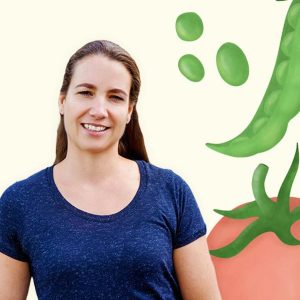Terramay, the place where almost all the groundbreaking happens simultaneously

560 heavenly hectares where almost all the groundbreaking happens simultaneously. That’s how I can best describe the regenerative Terramay (mother earth) of pea makers David and Anna de Brito.
(Please note that this text is translated by Open AI. I write my all my peas in Dutch)
This week, my camper is parked in the east of Portugal by the Alqueva river overlooking the Spanish shores. To reach the farm buildings, I drive for at least 15 minutes through picturesque hilly landscapes adorned with cork oaks, streams, and wandering Mertolenga cows, Pata Negra pigs, goats, horses, and sheep. Sometimes, I have to pinch myself; it’s so incredibly beautiful here.
But beauty isn’t necessarily the word David and Anna would use when they found this place in 2019. The estate is in poor condition and rapidly heading towards becoming a desert. The Portuguese David and the German Anna, who met nearly 20 years ago in Lisbon, decide together with their good friend and business partner Thomas Sterchi to embrace this area and transform it into a fertile and balanced ecosystem.
David and Anna are not farmers at that time, or even close. They live in Berlin and, together with Thomas, develop apps for the gastronomy and tourist sectors. But the state of the world makes them think. They want to contribute to solving the climate and food crises. But they also seek a way to let their children grow up closer to nature and long for a free life.
And that free life, they have achieved it. Spending a few days at Terramay feels like a great gift. The sunrises are beautiful, and I hear nothing but animals. But the daily reality is, of course, not always paradisiacal. It is Anna and David’s mission to make Terramay a self-sufficient and balanced ecosystem with fertile soil that produces healthy and delicious food. But with 560 hectares under their responsibility, that requires a lot of energy and a huge investment.
You might think; take it step by step. But not here. Energy overflows from Anna and David, and they go full steam ahead. A hundred thousand things are happening simultaneously. The wandering animals maintain the estate through holistic grazing and ultimately provide meat. Cork is produced, citrus fruits, olives, and grains are grown in strips combined with other crops, directly seeded in untilled land. Multiple food forests are also being planted.
The shining centerpiece is the organic garden where about 55,000 kilograms of vegetables, fruits, and herbs are grown annually. The ambition is to sell the entire harvest to restaurants in the area, what they call Gastronomy Supported Agriculture here. But most of the harvest goes to their own ‘table to beach bar’ restaurant Raya and is processed in the production kitchen into jams, pickles, pasta, and special oils. The goodies are then sold in the webshop.
David and Anna see Terramay as a platform to inspire people to look at the world from a different perspective. Therefore, Terramay must also become a meeting place, so that the impact of the company extends beyond the borders of the estate. Hence, they are working hard to set up sustainable tourism opportunities. A beautiful glamping has already seen the light of day, sustainable wooden cabins are being placed, there are horses for rides around the estate, and within two years, a luxury hotel should be built on top of the hill.
But they are also looking beyond the walls of the estate in their own region. Terramay is located in an area where villages are rapidly aging due to a lack of future prospects. That’s why the nearby village, Rosário, is involved in the plans. Terramay is now the third-largest employer in the region, the office is located in Rosário, and in May, Terramay will open a bakery there. Because a pasteleria and fresh bread are indispensable parts of a livable community in Portugal.
I can actually only conclude with one thing: if you have the opportunity, come and see it!
Ik ben Chantal en reis door het land in mijn camper searching for peas. Ik maak verhalen vol inspiratie over peasmakers; voedselveranderaars die werken met hun hart en zo de wereld veranderen. Ik ga aan de slag bij ze voor een dag of week. Zo leer ik hun missie beter kennen en kom ik erachter wat hen drijft als persoon. In de tussentijd probeer ik te ontdekken wat het voor mij betekent om een goed leven te leven. Mijn ervaringen deel ik met jullie.












